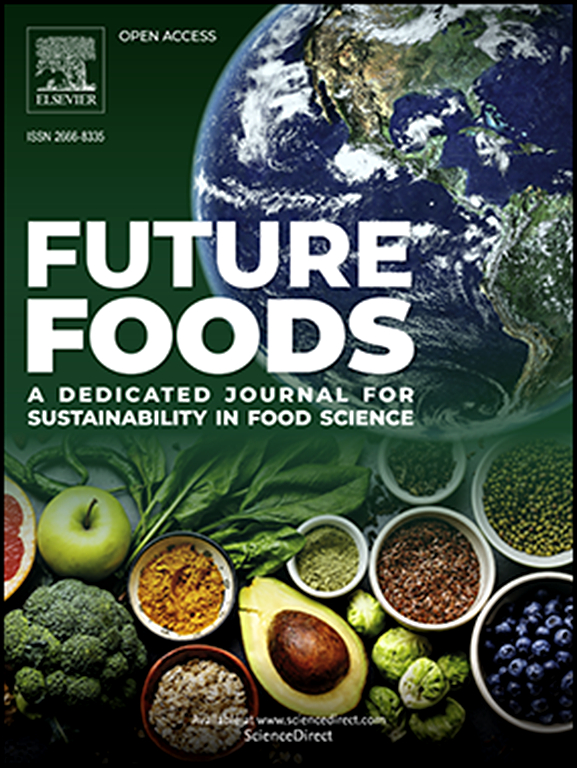Improving iron content in sustainable mycoprotein production through seawater fermentation
IF 7.2
Q1 FOOD SCIENCE & TECHNOLOGY
引用次数: 0
Abstract
The growing global population and rising protein demand are straining freshwater resources. Fusarium venenatum (Fv) mycoprotein offers a sustainable protein alternative, with environmental efficiency and potential health benefits. However, its low iron content remains a concern, especially for vegetarians and vegans. This study introduces a sustainable approach, employing seawater as a fermentation medium for Fv production. Our analysis reveals that mycoprotein derived from SEA Fv exhibits elevated levels of sodium and calcium, with a notably high iron content (2.2 mg/100 g wet weight). The sodium content, while 3.31 times higher than in non-seawater fermentation, remains within recommended daily intake parameters. No plasticizers or heavy metals were detected in the SEA Fv cell body, minimizing long-term toxicity risks from seawater use. A unique metabolite, dihydroorotic acid, was identified from an in-house library of 774 metabolites, serving as an internal biomarker for seawater-based production methods. An acute safety study condensing 600 g of SEA Fv to simulate high mycoprotein digestion showed no effects on key physical behaviors or major organs, including the heart and lungs. This positions the product as a viable protein alternative with enhanced iron content, highlighting seawater-based fermentation as a sustainable method for future food production and industry progress.
通过海水发酵提高可持续菌体蛋白生产中的铁含量
全球人口的不断增长和对蛋白质需求的不断增加使淡水资源日趋紧张。Fusarium venenatum(Fv)菌体蛋白提供了一种可持续的蛋白质替代品,具有环境效益和潜在的健康益处。然而,它的低铁含量仍然是一个令人担忧的问题,尤其是对素食主义者来说。本研究介绍了一种可持续的方法,即利用海水作为发酵介质来生产 Fv。我们的分析表明,从 SEA Fv 提取的霉菌蛋白钠和钙含量较高,铁含量也很高(2.2 毫克/100 克湿重)。钠含量是非海水发酵的 3.31 倍,但仍在建议的每日摄入量范围内。SEA Fv 细胞体中未检测到增塑剂或重金属,最大程度地降低了使用海水的长期毒性风险。从内部的 774 种代谢物库中发现了一种独特的代谢物--二氢乳清酸,可作为基于海水的生产方法的内部生物标志物。一项急性安全研究将 600 克 SEA Fv 浓缩以模拟高霉菌蛋白消化,结果表明对关键的身体行为或主要器官(包括心脏和肺)没有影响。这将该产品定位为一种铁含量更高的可行蛋白质替代品,突出表明海水发酵是未来食品生产和工业进步的一种可持续方法。
本文章由计算机程序翻译,如有差异,请以英文原文为准。
求助全文
约1分钟内获得全文
求助全文
来源期刊

Future Foods
Agricultural and Biological Sciences-Food Science
CiteScore
8.60
自引率
0.00%
发文量
97
审稿时长
15 weeks
期刊介绍:
Future Foods is a specialized journal that is dedicated to tackling the challenges posed by climate change and the need for sustainability in the realm of food production. The journal recognizes the imperative to transform current food manufacturing and consumption practices to meet the dietary needs of a burgeoning global population while simultaneously curbing environmental degradation.
The mission of Future Foods is to disseminate research that aligns with the goal of fostering the development of innovative technologies and alternative food sources to establish more sustainable food systems. The journal is committed to publishing high-quality, peer-reviewed articles that contribute to the advancement of sustainable food practices.
Abstracting and indexing:
Scopus
Directory of Open Access Journals (DOAJ)
Emerging Sources Citation Index (ESCI)
SCImago Journal Rank (SJR)
SNIP
 求助内容:
求助内容: 应助结果提醒方式:
应助结果提醒方式:


